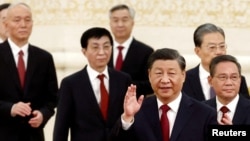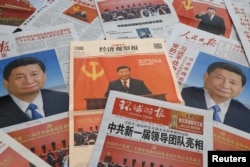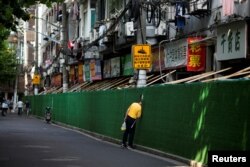After 10 years of China’s Xi Jinping leadership, the prospect of five more years under his rule, with a new team of top leaders believed to be handpicked by him, is frowned upon by some people, but welcomed by others.
“A lot of people I know don’t really like him,” said a Beijing resident who wants to be identified only as Lea. “Wages have gone up in the past 10 years, but so has inflation; everything has gotten a lot more expensive. We don’t see a lot of benefits from him.”
Lea was disappointed that Xi plans to continue China’s three-year long zero-COVID policy, which has seen cities undergo sudden lockdowns, and is blamed for hurting China’s economy and raising youth unemployment.
“The epidemic is not that serious anymore. Other countries have opened up, but not China,” she said.
Some citizens, however, have confidence that Xi and his new team will fix the problems that have arisen from China’s past decades of rapid and largely-unregulated development — including the huge housing bubble and the lack of capital gains and property taxes that have widened the wealth gap.
Fujian province native Xu Shengyi, who owns a small business in Hong Kong, said he agreed with Xi’s plan to build “common prosperity” by reforming the tax system.
“It will be fairer and let the poor live better, eat better,” said Xu.
He said he didn’t mind Xi serving a third term and possibly indefinitely, as long as he does a good job. Xu also doesn’t object to Xi filling the Communist Party’s most powerful seven-member Politburo Standing Committee only with his allies.
“You must have a united team to get things done,” said Xu, rejecting speculation that Xi was hoarding power by completely sidelining officials from other factions.
“China won’t go back to the days of the Cultural Revolution,” Xu said, referring to the period from 1966-1976 when factional fighting led to political and societal upheaval. “The people who will work below him are all experienced and open-minded and since they are in agreement, they can get things done.”
Others, however, were not so sure.
“I had confidence in him (Xi) back in 2018, but I’ve since lost confidence because of how he dealt with the epidemic,” said a woman who asked not to be named due to concerns she might get in trouble with the authorities. “Now I feel despair.”
She said many places were locked down without advance notice and a friend nearly fainted from hunger when his city suddenly went into lockdown, and he couldn’t leave his apartment complex to buy food.
“He thanks me for keeping him alive because I kept calling him. An elderly woman in his apartment building later gave him four potatoes and that’s how he survived,” she said, criticizing the lockdowns as “inhumane.”
Local authorities have been blamed for bungling the lockdowns, but some believe the zero-COVID policy instills so much fear in officials that they take excessive measures to prevent infections in their jurisdiction. The government, however, has credited the zero-COVID policy with saving millions of lives.
Some worry that there will be a continuation of the government’s encroachment into their daily lives under Xi.
“A lot of my friends feel China is returning to the ‘60s and ‘70s. We used to talk about many things on WeChat [a messaging App] but not anymore,” said the woman, suspecting that technology is being used to detect sensitive words in text messages or even private online conversation.
Others complain of the government blocking virtual private network (VPN) services, preventing them from accessing banned overseas websites and uncensored information. The Communist Party is believed to be worried about color revolutions and the influence of Western ideas that could complicate its plans for the country, or even pose a challenge to its rule.
Private tutorial companies have also been shut down under Xi. It is believed the government doesn’t want an unequal system where the rich can afford to send their children to tutorials that help them do well on tests and get into the top schools, leaving those who can’t afford the tuition unable to compete. Tutorials also over-emphasize test-taking skills and reduce children’s free time, which is seen as running contrary to the government’s hopes of building a more innovative economy.
Some parents complain the crackdown has forced them to rely on underground tutors operating stealthily, worsening the situation.
Additionally, there are worries Xi will try to make society more equal, by taking wealth from China’s increasing number of super rich people, although most economists don’t believe he would do that and would instead reform the outdated tax system. His government already has pressured big tech to donate to charities and cracked down on high-earning celebrities for tax evasion.
In his speech at the opening of the week-long Party Congress that ended on Sunday, he mentioned the need to build a socialist market economy and plans to “enhance the roles of taxation,” and “keep income distribution and the means of accumulating wealth well-regulated,” while criticizing “money worship.”
“We will protect lawful income, adjust excessive income, and prohibit illicit income,” Xi said.
Businessman Xu is not worried the party will revert to its practices in its early years of seizing assets from the wealthy and even taking over middle-class families’ homes, subdividing them and letting other families move in.
“It’s not about confiscating your property. If one person buys 10 pieces of property, more than they can live in, how can other people afford to buy?” said Xu, adding that the mainland should not be like Hong Kong, where a few tycoons control almost everything and property prices are so high that many people can’t afford to buy a home.
As for Lea, she hopes Xi will truly make Chinese society equal, including for its millions of migrant workers.
Her son had to return to their home province last year because she and her husband are migrants in Beijing. Under China’s “hukou,” or household registration system, education and other benefits are tied to where people are registered to live, no matter how long they have worked in and contributed to big cities. Without Beijing residency, Lea’s son can’t take high school entrance exams there.
“I miss him a lot,” said Lea, who plans to return to her home province when she retires, even though she has lived in the capital for 24 years. “We can’t afford to buy a home here.”










